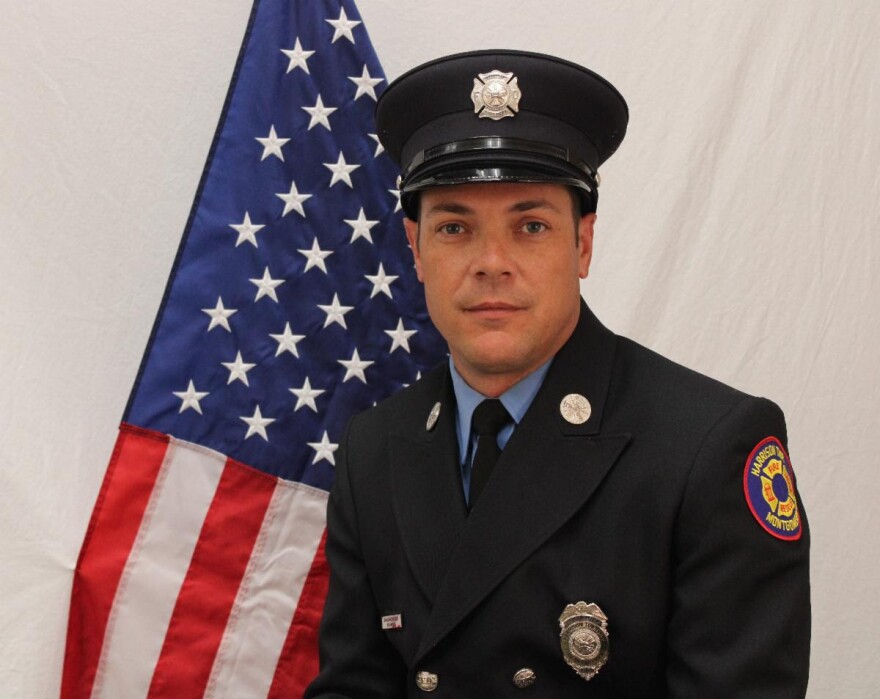Harrison Township Fire Department Lt. Daniel Davenport is credited with saving the lives of a local family. recently
According to the department, Davenport and his crew responded to a call from a home on Halworth Road. The residents had concerns about potential carbon monoxide leaks from their recently repaired furnace. The fire crew could not detect any CO emissions when they inspected the furnace but Lt. Davenport installed a CO detector near the furnace “to provide the family with peace of mind.”
That detector ended up saving the families lives just 10 days later when it alerted fire crews to a dangerously high level of CO.
For his “above and beyond” decision to install the detector, Lt. Davenport earned a commendation from Fire Chief Mike Crist, who tells WYSO that those detectors — which many people still don’t have — can protect us from an extremely dangerous gas.
This interview has been lightly edited for length and clarity.
Fire Chief Mike Crist: Carbon monoxide is odorless and colorless. You don't smell it. You don't see it. You don't know anything about it. The only way that you will have any indication without a detector is symptoms. But the problem you run into is the symptoms:you're lightheaded, dizzy, you're nauseous, your heart may speed up a little bit, which are massive indicators of that. And typically in this season that we're in now, because we're running our furnaces, our hot water heaters more often.
But the problem is those also mirror flu like symptoms. So that's one of the problems we run into is I don't want to tell everybody that if you have flu-like symptoms, it is carbon monoxide related, but at the beginning of the season when we're turning our heaters on, we're turning everything on. Something as simple as a bird blocks a flu ecoming out of the roof line, just because you're looking for a little bit of warmth, or an animal gets into something or a myriad of different options blocks that flue, that exhaust has to go somewhere. And when it does and of course, right back into the house, that's when people don't know.
Jerry Kenney: Let's say you've got the carbon monoxide detector. It goes off. You are cognizant of that and able to take steps. What are those steps?
Crist: The easiest step is, regardless of what community you live in, if you have a carbon monoxide detector going off, call us. Call the fire department, call 911. They're going to tell you, 'Hey, go step outside. I know it's cold. Go get in the car. Start the car up, get warm. Just stay in the car outside.' When the fire department arrives, they'll come up to the car and talk to you there. Let them go inside and check it out, figure out what the levels are. If they're harmful levels they'll isolate it, clear all the issues out before you come back in so you're at no risk of having any kind of contamination inside your body. And if there is, if the levels are harmful, we have tools to be able to test that as well.
So the difference is most things like you would buy at your typical pharmacy that measures oxygen in your blood. Carbon monoxide binds to your molecules the exact same way, or to the blood cells the same way that oxygen does - so if you try to measure your oxygen level with one of those SpO2 meters (a blood-oxygen monitor), it will say 100%. So the problem is, if you think everything's fine, but it's really carbon monoxide.
You have to have special tools to be able to measure that. And again, most of the fire departments around, including us, we carry all those so we can measure if there is something harmful in your blood. And if there is, we'll go through the right treatments. We'll take care of them. There are hundreds of thousands of people hospitalized each year for this kind of thing and there are over 400 deaths across the nation just in carbon monoxide related deaths.
Kenney: I'm guessing a lot of people still don't have carbon monoxide detectors. How can they get one?
Crist: It is the really low percentage of people at home. One of the advantages the residents have in our community is through a lot of federal funding, I was able to obtain thousands of smoke detectors. So anybody who lives in this community, we give those out, we install them for free for smoke detectors. And we actually have a partnership with the firefighters’ credit union in the City of Dayton. They donate carbon monoxide detectors to us on an annual basis. And we do the same thing with those. Anybody that's in our community, we go out, we'll take care of them, we'll install them. And whether it is because of an incident like this, or they call us to say, ‘hey, we don't know what's going on, you know, do you guys have an option for us,’ again, we'll come out, we'll take care of it. We'll show you the best place to put them and then go ahead and install it free. But if your community doesn't have that luxury, you can get them at any really hardware store. You can get them at your big box stores. Most of them all have those.


